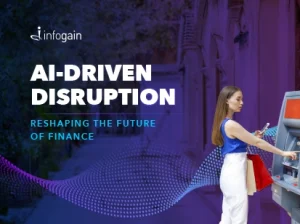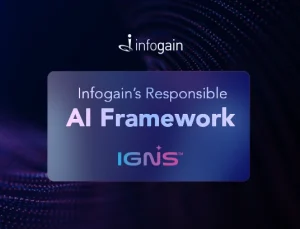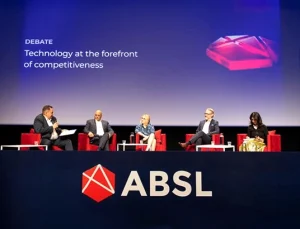- Posted on : March 31, 2021
-
- Industry : Corporate
- Type: News

The following interview with our CTO Sumant Ahuja, published in ET CIO on March 25th, 2021. Follow this link to view the original article.
I like being a technology leader because...
I am professionally most engaged when I am iterating through hard-to-solve challenges, often when paths are not linear, and successes are in small increments. Further, I like being a technology leader because it enables me to participate in the process of building innovative technology-enabled solutions for customers, as well as execute programs focused on capability development (people, processes, and technology) across the organization. The positive impact on our customers and the professional upliftment of co-workers heighten my sense of fulfillment and accomplishment.
An 'Aha ' leadership moment in your professional career.
I started my technology career with a Big 5 IT consulting company. From the get-go, I was positioned in leadership roles. I would spend days and nights perfecting the work of my team members. While projects were being delivered successfully, I was reasonably sure that I was going about it the wrong way. This approach continued even after founding a technology services company (Silicus). As founder things became even more personal, and my approach harder for everyone around me. Then, a personal health situation forced me to take a back seat for a few months. I saw my team members step up and take ownership, and things moved along just fine, with minimal involvement from my end. My personal situation had provided a common sense of purpose for everyone in the team to band together.
This timeframe offered me a few lessons in leadership. Teams can achieve impressive outcomes when they carry a common (as opposed to individual) sense of purpose. Its not the economic exchange with an employee, but the sense of common purpose that drives teams to overachieve. I was set on my next quest - how do you build a purpose-driven team or even an organization, and how do you discover that purpose?
As a technology leader what was the toughest decision you made?
As a technology services company, Silicus was focused on providing software engineering services for its first twelve years. It was getting increasingly hard to differentiate ourselves from the competition. After inputs from multiple advisors and much analysis, we decided to reposition the company as a provider of cloud transformation services. We had built a strong partnership with Microsoft, but our capabilities needed to grow manifold - across infrastructure, software, IoT, data, and analytics. The decision to reposition required us to transform the organization. We accomplished this by learning and building new service capabilities, adding talent in new areas, successfully executing new kinds of engagements, and acquiring another company to deepen our capabilities. There were several tough decisions along the way in terms of prioritizing our focus areas, our spending on R&D and capability development, and most importantly staying on course through the challenging times. I challenged a small team to guide us through the transformation, while the larger team made sure our existing business remained stable. This small team powered with a common sense of purpose and ownership pulled through a successful transformation over the next few years. In due course, Silicus was acquired by a larger technology services company, Infogain, for our cloud transformation capabilities.
What's the 'next big thing' in your industry vertical?
Infogain is focused on providing technology services to Fortune 2000 customers. In the last several months, in response to COVID-19 crisis, businesses have accelerated the digitalization of customer interactions as well as internal operations, in addition to adding digital or digitally enabled services and products to their portfolio. The demand for adoption of digital technologies has swelled containerized development, cloud data modernization, digital experience transformation, and more. The technology services industry is struggling to keep up with this demand, especially in these new digital technologies. One of my primary charters as CTO at Infogain is to ensure that we meet this demand by rapidly growing both - our teams and our competency in these technology areas.
One thing that IT departments should do better.
IT departments should place a high priority on building a strong cybersecurity defence with multiple layers of security so that if one layer is breached, successive layers can keep attackers away from sensitive business data. The question is no longer will you be attacked; but are you prepared to protect the business against an attack.
Where do you see the CTOs role heading in the future?
It is fair to say that new technologies have been at the center of business trends internet, mobile, social, cloud, and now artificial intelligence. These technologies have enabled a sea of change in the business landscape, forcing businesses into digital and cloud transformation journeys. A visionary technology leader can alter the trajectory of a business. To be effective in doing so, they need to play both functional and strategic roles simultaneously.
One thing that CTOs should learn from the business?
While a CIO can learn many things from business, to be successful, they must be seen as a transformative leader. They need to actively participate in building business strategies that align with the company's financial and operational goals. In my experience, when you collaborate with business unit leaders, keep an eye on customer satisfaction and take responsibility for digital initiatives that generate business impact.
If you were famous, what would you choose to be?
I would want to be famous for different reasons at different times in my life. Today, I would want to be famous for inventing technology capable of producing safe vaccines in weeks and not months or years.
If you had unlimited amounts of money, what would you really do with your life?
I do not believe the money would change anything in my life. I am content and well-challenged in my current role as CTO. I have been an entrepreneur and a CEO for 20 years, but I have always been a technologist at heart, and as CTO, I get to do more of what I enjoy.






